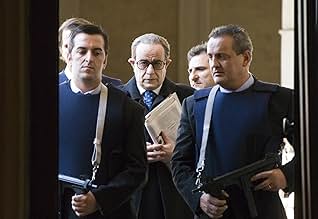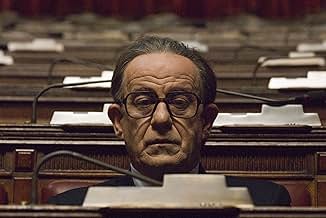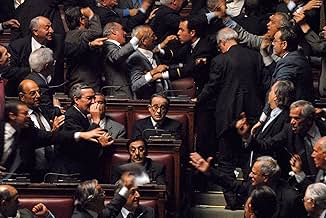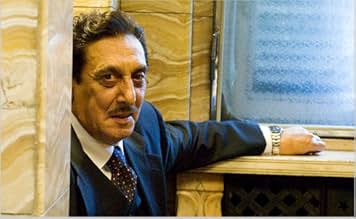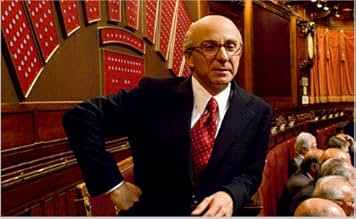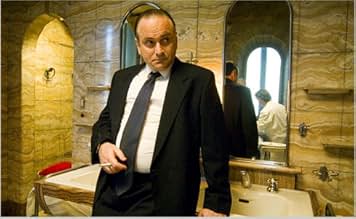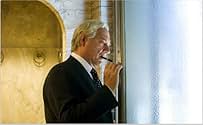CALIFICACIÓN DE IMDb
7.2/10
20 k
TU CALIFICACIÓN
La historia del político italiano Giulio Andreotti, que fue primer ministro de Italia siete veces desde la restauración de la democracia en 1946.La historia del político italiano Giulio Andreotti, que fue primer ministro de Italia siete veces desde la restauración de la democracia en 1946.La historia del político italiano Giulio Andreotti, que fue primer ministro de Italia siete veces desde la restauración de la democracia en 1946.
- Nominado a 1 premio Óscar
- 32 premios ganados y 40 nominaciones en total
- Dirección
- Guionista
- Todo el elenco y el equipo
- Producción, taquilla y más en IMDbPro
Opiniones destacadas
Giulio Andreotti is the seven times Prime Minister of Italy leading the ruling Christian Democracy Party. In 1978, The Red Brigades kidnaps his rival former Prime Minister Aldo Moro. Andreotti refuses to negotiate and Moro is killed. Over the next 15 years, various people are mysteriously killed. In 1991, he's named Senator for Life. In 1992, he resigns as Prime Minister. His bid for the Presidency fails and he goes on trial for corruption with the Mafia.
I have one problem with this movie and it's a big one. I feel like I did a PhD on Italian politics watching this movie. The first half is nearly impossible to follow for someone like me who knows nothing about Italy during this time. It's a lot of style but I couldn't understand the substance. There are a lot of deaths but I don't know the significance of some of them. The second half is more compelling with the criminal trial. It becomes a character study and Andreotti is an intriguing character. I'm sure this movie is much more compelling for people with a background in Italian politics during this time. A lot of this is going over my head.
I have one problem with this movie and it's a big one. I feel like I did a PhD on Italian politics watching this movie. The first half is nearly impossible to follow for someone like me who knows nothing about Italy during this time. It's a lot of style but I couldn't understand the substance. There are a lot of deaths but I don't know the significance of some of them. The second half is more compelling with the criminal trial. It becomes a character study and Andreotti is an intriguing character. I'm sure this movie is much more compelling for people with a background in Italian politics during this time. A lot of this is going over my head.
I'm sure if I were raised in Italy and paid attention to Italian politics day in and day out all of what transpires in Il Divo would be no less than engrossing. The story of Androetti, the head of a government that went for seven administrations and then went on to run for President has some really fascinating things to it. One of those is seeing just how the parliament works in those scenes midway through the picture and how the country actually chooses its president, which is so far removed from the US democratic process it's hard to fathom. And I also admired how the actor playing Androetti so got into this kind of quietly conniving politician, a man who believed that politics was everything and yet would never get passionate enough to raise his voice above a whisper. Somewhere inside of him a Dick Cheney is rumbling, perhaps.
But the problem in watching the film if you don't pay attention to the Italian politics of the period, or just in general, is that the filmmakers lose you fairly quickly. I usually find myself a viewer who doesn't like to be spoon-fed information very simply, but this is on the opposite end of the cannon where only a few real details are clear enough and then the rest comes whizzing by at a quick clip (and quick indeed as the camera style is akin to the operatic nature of Scorsese, only not as talented or focused). Names of characters keep coming up as title cards, and except for a couple of names like "The Lemon" (Androetti's right-hand man), none of them really stick out, and the incidents keep piling up without any real connection. At some point the basic story does reveal itself and holds some interest, but there's a disconnect between many scenes too, and a sense of cross-cutting done a few times (i.e. the horse race scene crossed with a shooting) comes off as unimaginative.
It's not a waste of time though if you're totally ignorant about Italy's political structure and brash sense of the power dynamic. But it's not one that I particularly enjoyed, either, and its lack of a connection with the mounting details made it harder to appreciate.
But the problem in watching the film if you don't pay attention to the Italian politics of the period, or just in general, is that the filmmakers lose you fairly quickly. I usually find myself a viewer who doesn't like to be spoon-fed information very simply, but this is on the opposite end of the cannon where only a few real details are clear enough and then the rest comes whizzing by at a quick clip (and quick indeed as the camera style is akin to the operatic nature of Scorsese, only not as talented or focused). Names of characters keep coming up as title cards, and except for a couple of names like "The Lemon" (Androetti's right-hand man), none of them really stick out, and the incidents keep piling up without any real connection. At some point the basic story does reveal itself and holds some interest, but there's a disconnect between many scenes too, and a sense of cross-cutting done a few times (i.e. the horse race scene crossed with a shooting) comes off as unimaginative.
It's not a waste of time though if you're totally ignorant about Italy's political structure and brash sense of the power dynamic. But it's not one that I particularly enjoyed, either, and its lack of a connection with the mounting details made it harder to appreciate.
Il Divo, which won the Jury Prize at Cannes last year and has recently been released in US movie houses, is a devastatingly ironic and highly stylized portrait of the strange, extraordinarily powerful and long-lived Italian politician Giulio Andreotti. He has been in Italian government in some office or other since the late 1940's. After slipping out of repeated convictions for Mafia ties in the past decade he remains "senator for life" at the age of 90, and he's been credited with helping bring down governments even quite recently.
The ultimate political survivor, Andreotti was seven times prime minister from 1972 to 1992. He's had a seat in the Italian parliament without interruption since 1946, and has also been Defense Minister, Foreign Minister, and President. In Andreotti's own view (though he walked out on the film) his wife of 60 years Livia (Anna Bonaiuto) and his long-serving secretary Vincenza Enea (Piera Degli Esposti), are both sympathetically portrayed in Il Divo. He really didn't like being shown kissing Mafia boss Toto Riina, which he has said never happened. In the film, Andreotti is most haunted by the Red Brigades' murder of the kidnapped of Aldo Moro, which he might have prevented.
Though Sorrentino's film is in some ways a detailed chronicle of Anreotti's 60-plus years of political power and dubious dealings, with a focus on the seventh government and its aftermath, the film seems more an exercise in style than an impassioned study of politics. The self-consciousness of its frequent uses of loud contrasting music, ceremonial, almost Kabuuki-like set pieces, and slow-motion to muffle scenes of violence are further underlined by the performance of Toni Servillo, who accurately, perhaps too accuately, mimics Andreotti's look, his hunched posture, even his oddly turned-down ears, and his puppet-like mannerisms. Staring forward, neck rigid, he keeps his arms close to his body and his hands turned inward and peers expressionlessly out of his big eyeglasses. He walks across the floor in quick tiny steps like some 18th-century Japanese court lady. There is no attempt by director or principal actor to charm or to involve. It seems Sorrentino, with Servillo's diligent collaboration, is laughing not only at Andreotti and at Italian politics, but at us.
Il Divo is soulless and cynical, but it is so stylish that it's bound to be remembered. It's some kind of ultimate statement of the essence of the slick, heavily-guarded world of Italian political corruption. In its own special, magisterially mean-spirited and pessimistic way it's an instant classic.
In this film, Andreotti, who has been referred to as "Il divo Giulio" ("The God Giulio," referencing the Roman Empire's deification of Julius Caesar), and by monikers like "Beelzebub," "The Fox," "The Black Pope," "The Prince of Darkness," and "The Hunchback," is a queer, nerdy, mummified-looking creature who hardly ever changes expression or cracks a smile. His rigid gestures and the odd commentary of his group of primary supporters, themselves all provided with gangster-style nicknames, lead to a series of scenes that suggest politics as caricatural facade, as almost pure ritual, with time out on occasion for jokes, self-pity, and cruelty to others. You won't hear constituents mentioned in this movie, though when somebody says another politician prays to God but he prays to the priest, Andreotti answers: "Priests vote. God doesn't." Politics is everything to him, and politics means the pursuit of power.
For a non-Italian the details of various moments from the Aldo Moro kidnapping and all the terrorism of the Brigate Rosse of the 1970's to the 1990 Mafia trials may be pretty confusing. It's not that the filmmakers don't care; they're primarily talking to an Italian audience. But even for such an audience, they're keeping an ironic distance.
The facade never cracks. In one scene, typically staring straight forward, Andreotti delivers an impassioned speech of self-defense, raising his voice almost to a shout at the end, but without moving a muscle of his face. Servillo is a noted man of the theater in Italy and his whole performance is a chilly tour de force that inspires awe without giving much pleasure. Andreotti in this soliloquy--which highlights the film's often solipsistic feel--argues that a leader must manipulate evil in order to maintain good. This may fit in with the evidence that he collaborated with the Mafia, and yet at times was severe in repressing it.
In life as in this film Andreotti has compensated for what may be the lack of visible humanity by being a wit, and Il Divo crams as many of the famous battute or one-lineers into scenes as it can. One was "the trouble with the Pope is that he doesn't know the Vatican." Another: "They blame me for everything, except the Punic wars." "Signor Andreotti, how do you keep your conscience clean?" he was once asked. "I never use it," he replied. Other bons mots among many: "The trouble with the Red Brigades is they're too serious," and "Power is fatiguing only to those who don't have it." The world of Italian politics is baffling to the outsider. Andreotti's cool detachment and wit and this film's stylized cynicism may be the best approach to its deviousness and complexity.
Last year Servillo also played one of the main characters in Matteo Garrone's Gomorrah, where he's an out-and-out Mafia functionary. Gomorrah won Cannes' number-two award (just below the Golden Palm) the Grand Prize, last year, which given Il Divo's Jury Prize prompted declarations of a rebirth of Italian cinema in the making. Non-Italians like Mafia movies; Italians are sick of them, and might have wished for patriotic reasons that their best filmmakers had won applause by turning to some other subject matter. Both these films are cold, detached, and analytical. Maybe they mean Italians are getting serious about their own film industry and want to look the country's ugliest aspects right in the eye. But don't look for hope here. A great cinema requires more humanity than this.
The ultimate political survivor, Andreotti was seven times prime minister from 1972 to 1992. He's had a seat in the Italian parliament without interruption since 1946, and has also been Defense Minister, Foreign Minister, and President. In Andreotti's own view (though he walked out on the film) his wife of 60 years Livia (Anna Bonaiuto) and his long-serving secretary Vincenza Enea (Piera Degli Esposti), are both sympathetically portrayed in Il Divo. He really didn't like being shown kissing Mafia boss Toto Riina, which he has said never happened. In the film, Andreotti is most haunted by the Red Brigades' murder of the kidnapped of Aldo Moro, which he might have prevented.
Though Sorrentino's film is in some ways a detailed chronicle of Anreotti's 60-plus years of political power and dubious dealings, with a focus on the seventh government and its aftermath, the film seems more an exercise in style than an impassioned study of politics. The self-consciousness of its frequent uses of loud contrasting music, ceremonial, almost Kabuuki-like set pieces, and slow-motion to muffle scenes of violence are further underlined by the performance of Toni Servillo, who accurately, perhaps too accuately, mimics Andreotti's look, his hunched posture, even his oddly turned-down ears, and his puppet-like mannerisms. Staring forward, neck rigid, he keeps his arms close to his body and his hands turned inward and peers expressionlessly out of his big eyeglasses. He walks across the floor in quick tiny steps like some 18th-century Japanese court lady. There is no attempt by director or principal actor to charm or to involve. It seems Sorrentino, with Servillo's diligent collaboration, is laughing not only at Andreotti and at Italian politics, but at us.
Il Divo is soulless and cynical, but it is so stylish that it's bound to be remembered. It's some kind of ultimate statement of the essence of the slick, heavily-guarded world of Italian political corruption. In its own special, magisterially mean-spirited and pessimistic way it's an instant classic.
In this film, Andreotti, who has been referred to as "Il divo Giulio" ("The God Giulio," referencing the Roman Empire's deification of Julius Caesar), and by monikers like "Beelzebub," "The Fox," "The Black Pope," "The Prince of Darkness," and "The Hunchback," is a queer, nerdy, mummified-looking creature who hardly ever changes expression or cracks a smile. His rigid gestures and the odd commentary of his group of primary supporters, themselves all provided with gangster-style nicknames, lead to a series of scenes that suggest politics as caricatural facade, as almost pure ritual, with time out on occasion for jokes, self-pity, and cruelty to others. You won't hear constituents mentioned in this movie, though when somebody says another politician prays to God but he prays to the priest, Andreotti answers: "Priests vote. God doesn't." Politics is everything to him, and politics means the pursuit of power.
For a non-Italian the details of various moments from the Aldo Moro kidnapping and all the terrorism of the Brigate Rosse of the 1970's to the 1990 Mafia trials may be pretty confusing. It's not that the filmmakers don't care; they're primarily talking to an Italian audience. But even for such an audience, they're keeping an ironic distance.
The facade never cracks. In one scene, typically staring straight forward, Andreotti delivers an impassioned speech of self-defense, raising his voice almost to a shout at the end, but without moving a muscle of his face. Servillo is a noted man of the theater in Italy and his whole performance is a chilly tour de force that inspires awe without giving much pleasure. Andreotti in this soliloquy--which highlights the film's often solipsistic feel--argues that a leader must manipulate evil in order to maintain good. This may fit in with the evidence that he collaborated with the Mafia, and yet at times was severe in repressing it.
In life as in this film Andreotti has compensated for what may be the lack of visible humanity by being a wit, and Il Divo crams as many of the famous battute or one-lineers into scenes as it can. One was "the trouble with the Pope is that he doesn't know the Vatican." Another: "They blame me for everything, except the Punic wars." "Signor Andreotti, how do you keep your conscience clean?" he was once asked. "I never use it," he replied. Other bons mots among many: "The trouble with the Red Brigades is they're too serious," and "Power is fatiguing only to those who don't have it." The world of Italian politics is baffling to the outsider. Andreotti's cool detachment and wit and this film's stylized cynicism may be the best approach to its deviousness and complexity.
Last year Servillo also played one of the main characters in Matteo Garrone's Gomorrah, where he's an out-and-out Mafia functionary. Gomorrah won Cannes' number-two award (just below the Golden Palm) the Grand Prize, last year, which given Il Divo's Jury Prize prompted declarations of a rebirth of Italian cinema in the making. Non-Italians like Mafia movies; Italians are sick of them, and might have wished for patriotic reasons that their best filmmakers had won applause by turning to some other subject matter. Both these films are cold, detached, and analytical. Maybe they mean Italians are getting serious about their own film industry and want to look the country's ugliest aspects right in the eye. But don't look for hope here. A great cinema requires more humanity than this.
This movie puts on screen what all Italians know since decades: directly or indirectly Andreotti is behind all major events happened in Italy in the last 45 years. This is what we know, as we all knew that virtually all politicians at all level were (and are) robbing the public funds and make private deals with business men.
The movie shows exactly this: we know it but we do not have the evidences.
Sorrentino tries to bridge this gap by putting together a lot of informations that make a pretty clear scenario, but without evidences. The result is a portrait of a divinity: you know that is there, you know that everything happens because of his will, but on earth everything happens by chance so that the fact that Andreotti is the mastermind of everything becomes a matter of divine faith.
The strength of the movie rests on the capacity to describe a personality that is so powerful that does not need to speak, does not need to go on TV, he is able to make things happen in a way that only Andreotti knows. Andreotti is above the politics, above the Church, above finance, above mafia, he is depicted as a power that stands on its own, someone who uses all the different leverages to rule.
Andreotti got it away with his trials and only Andreotti knows how. For a man of his power, it was the least you could expect.
At the end, Italians have to acknowledge that in the 20th century Italy was ruled by the King (shortly), Mussolini and Andreotti. But if you remember the Glossary shown at the beginning of the movie, through the Loggia P2, Sorrentino suggests that Berlusconi could be the person in charge to continue the job. Whether this is the will of Andreotti or not is a matter of faith.
The movie shows exactly this: we know it but we do not have the evidences.
Sorrentino tries to bridge this gap by putting together a lot of informations that make a pretty clear scenario, but without evidences. The result is a portrait of a divinity: you know that is there, you know that everything happens because of his will, but on earth everything happens by chance so that the fact that Andreotti is the mastermind of everything becomes a matter of divine faith.
The strength of the movie rests on the capacity to describe a personality that is so powerful that does not need to speak, does not need to go on TV, he is able to make things happen in a way that only Andreotti knows. Andreotti is above the politics, above the Church, above finance, above mafia, he is depicted as a power that stands on its own, someone who uses all the different leverages to rule.
Andreotti got it away with his trials and only Andreotti knows how. For a man of his power, it was the least you could expect.
At the end, Italians have to acknowledge that in the 20th century Italy was ruled by the King (shortly), Mussolini and Andreotti. But if you remember the Glossary shown at the beginning of the movie, through the Loggia P2, Sorrentino suggests that Berlusconi could be the person in charge to continue the job. Whether this is the will of Andreotti or not is a matter of faith.
Biographical films tend to be respectful to the historical figures that they describe. Even when they describe complex and controversial characters they try to explain and to put in context the motivation of deeds which in the perspective of history seem evil. Paolo Sorrentino's 'Il Divo' is quite the contrary, it is a negative biography about a character who dominated the Italian politics for most of the second part of the 20th century, the leader of the Christian-Democratic Party and seven-times Prime Minister of Italy, Giulio Andreotti. The film does not lack complexity - quite the contrary - and the historical context of the 80s and 90s is described in detail, but the effect is willingly opposite than in usual biographies. Even political actions which would have seen candid or neutral seem to catch a strong significance and are seen through the perspective of the corruption and Mafia-relations which seem to have dominated Italian political life of the period.
My knowledge about the Italian politics is too superficial to make a definite judgment about the correctness of the facts presented on screen. What I can say after seeing the film is that it does not seem to pretend to be objective. Even if there is no explicit statement, there is neither any positive angle we brought into the film or positive dimension that is not questioned. Even the relationship with his wife ('I knew all these years what kind of man I married') or helping the poor (which looks more like a political exercise deprived of sincerity). There are however many other scenes (like the repeated walk on empty streets surrounded by cohorts of security people, the reception after his last nomination as Prime Minister) which describe not only the outer-worldness of the man, but also of the whole system.
Even more amazing is the fact that Andreotti was alive when this film was made (he actually died about a month ago) and has seen at least part of the film, allegedly walking out after a while. So this is not only a biography, but a pamphlet directed against a living politician. Andreotti, by the way, was no stranger to the Italian cinema industry, he played an important role in establishing the rules that protected the local industry against foreign (especially Hollywood) imports in the 50s, but also the establishment of a de-facto censorship over the content of the productions which was in place for many decades. Is this film also kind of a revenge of the now free industry over this character? Maybe.
To a very large extent 'Il DIvo' relies on the extraordinary acting performance of Toni Servillo. He makes one of these creations which in time tend to superpose and replace the visual representation we have about the real-life person. Great acting indeed, but do we end by understanding better Giulio Andreotti the man? I doubt it. Paolo Sorrentino certainly knows how to construct complex characters which do not show easily their intense internal beings. Looking now retrospectively he did the same thing in This Must Be the Place (which he made later, but I saw it before). He does not however serve the viewers with ready prepared answers about the motivation of his heroes. I knew very little about Andreotti before seeing this film, I know many more facts now, but the man remains a mystery.
My knowledge about the Italian politics is too superficial to make a definite judgment about the correctness of the facts presented on screen. What I can say after seeing the film is that it does not seem to pretend to be objective. Even if there is no explicit statement, there is neither any positive angle we brought into the film or positive dimension that is not questioned. Even the relationship with his wife ('I knew all these years what kind of man I married') or helping the poor (which looks more like a political exercise deprived of sincerity). There are however many other scenes (like the repeated walk on empty streets surrounded by cohorts of security people, the reception after his last nomination as Prime Minister) which describe not only the outer-worldness of the man, but also of the whole system.
Even more amazing is the fact that Andreotti was alive when this film was made (he actually died about a month ago) and has seen at least part of the film, allegedly walking out after a while. So this is not only a biography, but a pamphlet directed against a living politician. Andreotti, by the way, was no stranger to the Italian cinema industry, he played an important role in establishing the rules that protected the local industry against foreign (especially Hollywood) imports in the 50s, but also the establishment of a de-facto censorship over the content of the productions which was in place for many decades. Is this film also kind of a revenge of the now free industry over this character? Maybe.
To a very large extent 'Il DIvo' relies on the extraordinary acting performance of Toni Servillo. He makes one of these creations which in time tend to superpose and replace the visual representation we have about the real-life person. Great acting indeed, but do we end by understanding better Giulio Andreotti the man? I doubt it. Paolo Sorrentino certainly knows how to construct complex characters which do not show easily their intense internal beings. Looking now retrospectively he did the same thing in This Must Be the Place (which he made later, but I saw it before). He does not however serve the viewers with ready prepared answers about the motivation of his heroes. I knew very little about Andreotti before seeing this film, I know many more facts now, but the man remains a mystery.
¿Sabías que…?
- TriviaThe first cut of the movie was 145-minute long.
- Citas
Giulio Andreotti: I know I am an average man but looking around I do not see any giant.
- Créditos curiososEnd credits features the following dedication: "per Daniela, che mi ha salvato" ("for Daniela, who saved me"). Daniela D'Antonio is Paolo Sorrentino's wife.
- ConexionesFeatured in The 82nd Annual Academy Awards (2010)
- Bandas sonorasLa prima cosa bella
Written by Mogol, Gian Piero Reverberi and Nicola Di Bari
Performed by Ricchi e Poveri
Published by Universal Music Publishing Ricordi S.r.l.
Courtesy of EMi Music Italy S.p.a.
Selecciones populares
Inicia sesión para calificar y agrega a la lista de videos para obtener recomendaciones personalizadas
- How long is Il Divo?Con tecnología de Alexa
Detalles
Taquilla
- Presupuesto
- EUR 5,700,000 (estimado)
- Total en EE. UU. y Canadá
- USD 240,159
- Fin de semana de estreno en EE. UU. y Canadá
- USD 13,867
- 26 abr 2009
- Total a nivel mundial
- USD 11,260,366
- Tiempo de ejecución
- 1h 50min(110 min)
- Color
- Mezcla de sonido
- Relación de aspecto
- 2.35 : 1
Contribuir a esta página
Sugiere una edición o agrega el contenido que falta


